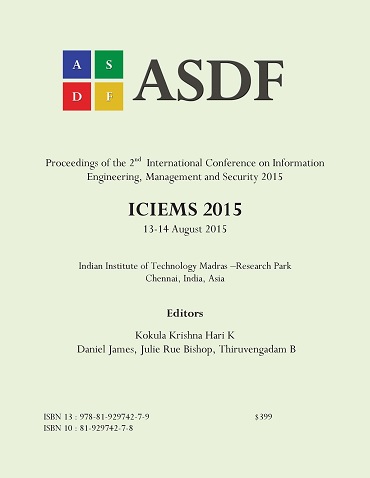- Publication Meta:Value
- Short Title:ICIEMS 2015
- Publisher:ASDF, India
- ISBN 13:978-81-929742-7-9
- ISBN 10:81-929742-7-8
- Language:English
- Type:Hard Bound - Printed Book
- Copyrights:ICIEMS Organizers / DCRC, London, UK
- Editor-in-Chief:Kokula Krishna Hari K
- Conference Dates:13 - 14, August 2015
- Venue Country:IITM-RP, Chennai, India
- Submitted Papers:410
- Acceptance Rate:4.11%
- Website:www.iciems.in
Welcome to ASDF Electronic Digital Library!
ICIEMS 2015
ICIEMS 2015
International Conference on Information Engineering, Management and Security 2015
Paper 029
Titanium Alloy Subjected to Tensile testing under Ambient and Cryogenic Conditions using Acoustic Emission Techniques
S Sundaram1, G Vetri Chelvan1
1Department of Mechanical Engineering, Vidyaa Vikas College of Engineering and Technology, Tiruchengode-637 214, Tamilnadu, India
Abstract
Titanium (Ti) alloys are strategic aerospace materials used in relatively severe working environment. Owing to the excellent properties such as high rigidity to weight ratio, elevated temperature strength, corrosion resistance and toughness in ambient as well as cryogenic environment, Titanium alloys find high technology applications in aerospace industries. As the Ti alloy finds application in aircraft engines, compressor blades and gas turbines, it is necessary to characterize the performance of this material under stress conditions. Acoustic Emission (AE) is a high sensitivity technique for detecting active microscopic events in a material under stress. The processes that are capable of changing the internal structure of a material such as dislocation motion, directional diffusion, creep, grain boundary sliding and twinning which are usually associated in plastic deformation and fracture are the sources of Acoustic Emission. Thus, using AE signals, it is possible to evaluate the performance of material under stress. The data acquired can be used to predict the performance of products made of Ti alloy. With this view, the acoustic emission response of Ti alloy subjected to tensile testing under ambient and cryogenic conditions have been studied.
Keywords
Author's Profile
Author profile can be generated and linked through our partners World Book of Researchers. To include your profile online Click Here. After it is approved, please email to edlib @ asdf.res.in to create a link with all the papers.
e-AID
ICIEMS.2015.029
Cite this Article as Follows
S Sundaram, G Vetri Chelvan. "Titanium Alloy Subjected to Tensile testing under Ambient and Cryogenic Conditions using Acoustic Emission Techniques." International Conference on Information Engineering, Management and Security (2015): 179-185. Print.
© 2010 - by EDLIB .
All Rights Reserved.

